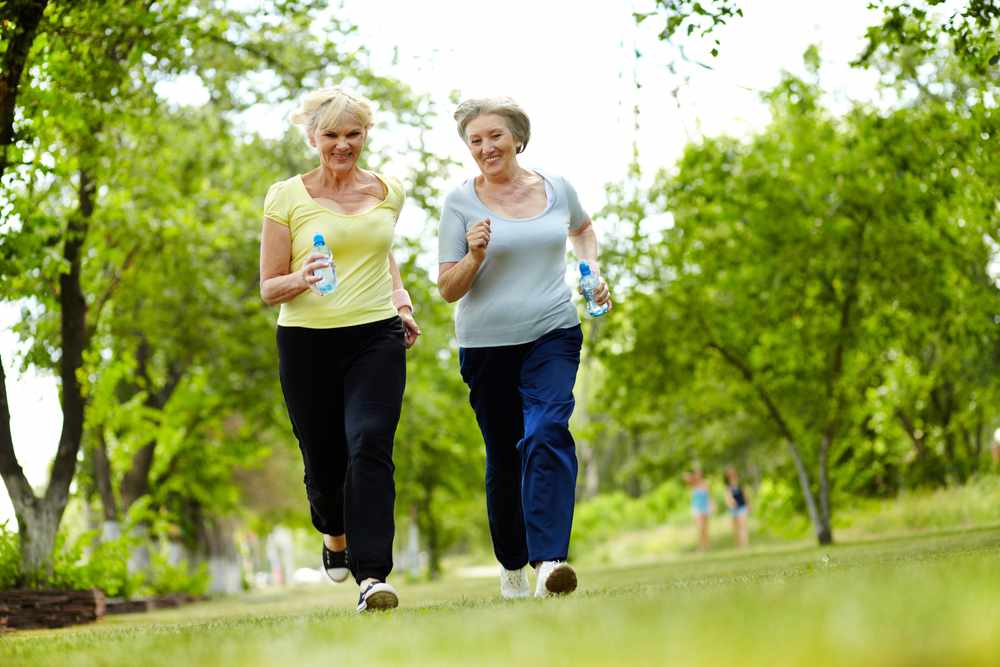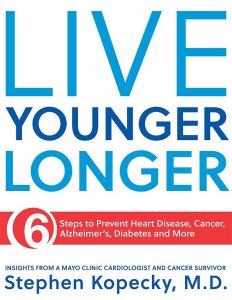-
Mayo Clinic book author gives insights on living younger longer by preventing disease

ROCHESTER, Minn. — While people know their health affects their longevity and quality of life, many struggle to do even the small things that will help them live younger longer. Stephen Kopecky, M.D., a preventive cardiologist at Mayo Clinic, shares his insights on protecting overall health and boosting the immune system from his book, "Live Younger Longer: 6 Steps to Prevent Heart Disease, Cancer, Alzheimer's and More," from Mayo Clinic Press. Dr. Kopecky is a two-time cancer survivor.
"There will always be risk factors we can't change — genetics, sex, age or a global pandemic," Dr. Kopecky says. "But we can control others, such as what we put in our bodies and how much exercise and sleep we get. Prevention should be the cornerstone of medicine because it helps to prepare for the unexpected. COVID-19 highlighted why we need to be more proactive."
Healthy eating
Eating lots of fruits and vegetables provides antioxidants and anti-inflammatory nutrients that help the immune system fight infections.
Dr. Kopecky recommends fruits, vegetables and healthy fats from olive oil and nuts, all found in the Mediterranean diet. These foods serve up antioxidants and anti-inflammatory nutrients, such as beta carotene, vitamin C, vitamin E and polyphenols to promote healthy immune responses. Polyphenols are plant-based micronutrients that control how the immune system responds.
What people eat also helps beneficial bacteria in the gut communicate with the immune system and the lungs, allowing for a more effective response to foreign invaders, such as respiratory viruses. Any disruption to this delicate balance of bacteria, such as an unhealthy diet or a medication such as an antibiotic, can make people more susceptible to infections and complications.
"We should be especially aware of the unhealthy, proinflammatory effects of ultraprocessed foods, which account for over half of the calories consumed in this country every day," Dr. Kopecky says.
Exercising
Regular moderate exercise increases the activity of virus-killing immune cells.
"Exercise has been shown to give the immune system a boost by maximizing the body's ability to take in and efficiently use oxygen, among other things. Moderate exercise, where you can talk but not sing while exercising, is enough to increase the activity of virus-killing cells both in the short term and long term. Even 20 minutes daily can help quell inflammation and boost immunity, and exercise can be divided up during the day," Dr. Kopecky says. "The best part about exercise is that it can be done anywhere. Leg lunges, situps, squats and stair-climbing are all easy exercises you can do at home."
Managing stress
Calming activities and supportive relationships minimize stress, reduce cortisol production and enhance the immune system's function.
"Concern about the health of our loved ones, our jobs, children's schooling and other stressors will cause an increased production of the hormone cortisol in the body, which in turn can suppress the immune system," Dr. Kopecky says. "Practicing mindfulness and stepping away from what's causing anxiety can help us stay grounded. Exercises that have calming or meditative qualities, such as qi gong and yoga, also are beneficial."
For those who don't have much time, try practicing gratitude by being thankful for three things when going to sleep at night or waking up in the morning. Dr. Kopecky says this habit has been shown to lower stress levels and reduce diseases due to stress.
Getting enough sleep
Adequate sleep boosts the number of immune cells circulating in the body and improves infection outcomes. The interaction between the immune system and sleep is a two-way street.
"When your immune system response kicks in, it changes your sleep. You may find yourself sleeping longer, for example, as your immune system stages an attack against a virus," Dr. Kopecky says. "When you're not sleeping well, you may notice that you get sick more easily. Getting adequate sleep can help support the way your immune system functions by increasing the number of immune cells circulating in your body."
Studies in humans on the relationship between sleep and infection link shorter sleep duration with increased risk of pneumonia and respiratory infections. The amount of sleep the immune system needs to function properly is individual. Dr. Kopecky suggests cultivating this habit: Try to put down the cellphone at least a couple of hours before bedtime. The blue light suppresses melatonin, which helps people get a good night's sleep.

Making healthy changes can seem an insurmountable challenge, but the book outlines easier lifestyle modifications to make the changes stick.
"We have something for you if you want to exercise but don't have much time, if you want to eat healthy but are concerned about costs, and if you want to change your lifestyle but you feel like you don't have enough willpower," Dr. Kopecky explains.
###
About Mayo Clinic
Mayo Clinic is a nonprofit organization committed to innovation in clinical practice, education and research, and providing compassion, expertise and answers to everyone who needs healing. Visit the Mayo Clinic News Network for additional Mayo Clinic news. For information on COVID-19, including Mayo Clinic's Coronavirus Map tracking tool, which has 14-day forecasting on COVID-19 trends, visit the Mayo Clinic COVID-19 Resource Center.
Media contact:
- Terri Malloy, Mayo Clinic Public Affairs, newsbureau@mayo.edu







